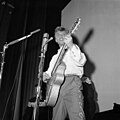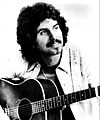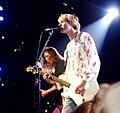Portal:Rock music
The Rock Music Portal
Rock is a broad genre of popular music that originated as "rock and roll" in the United States in the late 1940s and early 1950s, developing into a range of different styles from the mid-1960s, particularly in the United States and the United Kingdom. It has its roots in rock and roll, a style that drew directly from the black musical genres of blues, rhythm and blues, and country music. Rock also drew strongly from genres such as electric blues and folk, and incorporated influences from jazz and other musical styles. For instrumentation, rock is typically centered on the electric guitar, usually as part of a rock group with electric bass guitar, drums, and one or more singers. Usually, rock is song-based music with a 4
4 time signature and utilizing a verse–chorus form, but the genre has become extremely diverse. Like pop music, lyrics often stress romantic love but also address a wide variety of other themes that are frequently social or political. Rock was the most popular genre of music in the U.S. and much of the Western world from the 1950s to the 2010s.
Rock musicians in the mid-1960s began to advance the album ahead of the single as the dominant form of recorded music expression and consumption, with the Beatles at the forefront of this development. Their contributions lent the genre a cultural legitimacy in the mainstream and initiated a rock-informed album era in the music industry for the next several decades. By the late 1960s "classic rock" period, a few distinct rock music subgenres had emerged, including hybrids like blues rock, folk rock, country rock, Southern rock, raga rock, and jazz rock, which contributed to the development of psychedelic rock, influenced by the countercultural psychedelic and hippie scene. New genres that emerged included progressive rock, which extended artistic elements, heavy metal, which emphasized an aggressive thick sound, and glam rock, which highlighted showmanship and visual style. In the second half of the 1970s, punk rock reacted by producing stripped-down, energetic social and political critiques. Punk was an influence in the 1980s on new wave, post-punk and eventually alternative rock.
From the 1990s, alternative rock began to dominate rock music and break into the mainstream in the form of grunge, Britpop, and indie rock. Further fusion subgenres have since emerged, including pop-punk, electronic rock, rap rock, and rap metal. Some movements were conscious attempts to revisit rock's history, including the garage rock/post-punk revival in the 2000s. Since the 2010s, rock has lost its position as the pre-eminent popular music genre in world culture, but remains commercially successful. The increased influence of hip-hop and electronic dance music can be seen in rock music, notably in the techno-pop scene of the early 2010s and the pop-punk-hip-hop revival of the 2020s. (Full article...)
General images -
Selected article
The band released their first single, "Radio Free Europe", in 1981 on the independent record label Hib-Tone. It was followed by the Chronic Town EP in 1982, their first release on I.R.S. Records. Over the course of the decade, R.E.M. released acclaimed albums, commencing with their debut Murmur (1983), and continuing yearly with Reckoning (1984), Fables of the Reconstruction (1985), Lifes Rich Pageant (1986), Document (1987) and Green (1988). During their most successful period, they worked with the producer Scott Litt. With constant touring, and the support of college radio following years of underground success, R.E.M. achieved a mainstream hit with the 1987 single "The One I Love". They signed to Warner Bros. Records in 1988, and began to espouse political and environmental concerns while playing arenas worldwide.
R.E.M.'s most commercially successful albums, Out of Time (1991) and Automatic for the People (1992), put them in the vanguard of alternative rock as it was becoming mainstream. Out of Time received seven nominations at the 34th Annual Grammy Awards, and the lead single, "Losing My Religion", was R.E.M.'s highest-charting and best-selling hit. Monster (1994) continued its run of success. The band began its first tour in six years to support the album; the tour was marred by medical emergencies suffered by three of the band members. In 1996, R.E.M. re-signed with Warner Bros. for a reported US$80 million, at the time the most expensive recording contract ever. The tour was productive and the band recorded the following album mostly during soundchecks. The resulting record, New Adventures in Hi-Fi (1996), is hailed as the band's last great album and the members' favorite, growing in cult status over the years. Berry left the band the following year, and Stipe, Buck and Mills continued as a musical trio, supplemented by studio and live musicians, such as the multi-instrumentalists Scott McCaughey and Ken Stringfellow and the drummers Joey Waronker and Bill Rieflin. They also parted ways with their longtime manager Jefferson Holt, at which point the band's attorney Bertis Downs assumed managerial duties. Seeking to also renovate their sound, the band stopped working with Litt, and hired as co-producer Pat McCarthy, who had worked as mixer and engineer on the band's previous two albums.
After the electronic experimental direction of Up (1998), which was commercially unsuccessful, Reveal (2001), referred to as "a conscious return to their classic sound", received general acclaim. In 2007, the band was inducted into the Rock and Roll Hall of Fame in its first year of eligibility. Berry reunited with the band for the ceremony, and to record a cover of John Lennon's "#9 Dream" for the 2007 compilation album Instant Karma: The Amnesty International Campaign to Save Darfur to benefit Amnesty International's campaign to alleviate the Darfur conflict. Looking for a change of sound after lukewarm reception for Around the Sun (2004), the band collaborated with the producer Jacknife Lee on their final two studio albums—the well-received Accelerate (2008) and Collapse into Now (2011). In 2024, the band reunited to perform "Losing My Religion" at their induction into the Songwriters Hall of Fame. (Full article...)
Selected biography
Morrison began performing as a teenager in the late 1950s, playing a variety of instruments including guitar, harmonica, keyboards and saxophone for various Irish showbands, covering the popular hits of that time. Known as "Van the Man" to his fans, Morrison rose to prominence in the mid-1960s as the lead singer of the Belfast R&B band Them, with whom he wrote and recorded "Gloria", which became a garage band staple. His solo career started under the pop-hit-oriented guidance of Bert Berns with the release of the hit single "Brown Eyed Girl" in 1967.
After Berns's death, Warner Bros. Records bought Morrison's contract and allowed him three sessions to record Astral Weeks (1968). While initially a poor seller, the album has come to be regarded as a classic. Moondance (1970) established Morrison as a major artist, and he built on his reputation throughout the 1970s with a series of acclaimed albums and live performances.
Much of Morrison's music is structured around the conventions of soul music and early rhythm and blues. An equal part of his catalogue consists of lengthy, spiritually inspired musical journeys that show the influence of Celtic tradition, jazz and stream of consciousness narrative, of which Astral Weeks is a prime example. The two strains together are sometimes referred to as "Celtic soul", and his music has been described as attaining "a kind of violent transcendence". (Full article...)
Selected album
The Pale Emperor is the ninth studio album by American rock band Marilyn Manson. It was released on January 15, 2015, through lead singer Marilyn Manson's Hell, etc. label, and distributed in the United States by Loma Vista Recordings and internationally by Cooking Vinyl. The album was issued in standard and deluxe editions on CD and double LP vinyl, and as a limited edition box set. The standard version of the album contains ten tracks; the deluxe edition includes three acoustic versions as bonus tracks.
Produced by Manson and newcomer Tyler Bates, who Manson met through their mutual involvement in the TV series Californication, The Pale Emperor eschews the band's usual industrial rock style in favor of a sparser, blues rock-influenced sound. The album features drummer Gil Sharone, formerly of Stolen Babies and The Dillinger Escape Plan. It was the first album since his return to the band in 2008 to not include songwriting or performance contributions from bassist Twiggy Ramirez, who was busy with his own projects. The album is dedicated to Manson's mother, who died of Alzheimer's disease during production.
The album was released to positive reviews from music critics. Several writers referred to it as the band's best album in over a decade, and multiple publications ranked it as one of the best albums of 2015. It was also a commercial success, debuting at number eight on the Billboard 200 with the band's highest opening week sales since Eat Me, Drink Me (2007). It topped Billboard's Hard Rock Albums chart, as well as the national albums chart in Switzerland, and peaked within the top ten in fifteen other countries.
Three official singles were released, "Third Day of a Seven Day Binge", "Cupid Carries a Gun" and "Deep Six"; the latter became the band's highest-peaking single on Billboards Mainstream Rock Chart; "The Mephistopheles of Los Angeles" and "The Devil Beneath My Feet" have been released as promotional singles. The album was supported by The Hell Not Hallelujah Tour, which was interspersed with two co-headlining tours: The End Times with The Smashing Pumpkins, and a summer 2016 tour with Slipknot. ('Full article...)
Selected song
"Band on the Run" is a song by the British–American rock band Paul McCartney and Wings, the title track to their 1973 album Band on the Run.
Released as a single in April 1974 in the US and in June 1974 in the UK, it topped the charts and sold over a million copies in 1974 in the United States, and reached number 3 in the United Kingdom. An international success, it has become one of the band's most famous songs.
A medley of three distinct musical passages that vary in style, "Band on the Run" is one of McCartney's longest singles at 5:09. The song was partly inspired by a comment that George Harrison had made during a meeting of the Beatles' Apple record label. The song-wide theme is one of freedom and escape, and its creation coincided with Harrison, John Lennon and Ringo Starr having parted with manager Allen Klein in March 1973, leading to improved relations between McCartney and his fellow ex-Beatles.
The original demos for this and other tracks on Band on the Run were stolen shortly after Wings arrived in Lagos, Nigeria, to begin recording the album. With the band reduced to a trio consisting of McCartney, his wife Linda, and Denny Laine, "Band on the Run" was recorded at EMI's Lagos studio and completed at AIR Studios in London. (Full article...)
Selected picture

Elvis Presley meeting with US President Richard Nixon. On December 21, 1970.
Did you know (auto-generated)

- ... that raw material waste from the West influenced a generation of rock music in China?
- ... that the British rock musician Hannah Grae went viral online with an anti-sexual harassment parody of Aqua's "Barbie Girl"?
- ... that during his tenure as Governor of Central Java, Muhammad Ismail banned rock music concerts and car rallies?
- ... that heavy metal led Ossian D'Ambrosio to druidism?
- ... that Skálmöld & Sinfóníuhljómsveit Íslands documents a symphony orchestra playing heavy metal music?
- ... that the Liverpool Echo described British rock and roll star Tommy Steele as "quite unable to sing and play the guitar at the same time" when reviewing his first album?
Selected genre
Garage rock (sometimes called garage punk or '60s punk) is a raw and energetic style of rock music that flourished in the mid-1960s, most notably in the United States and Canada, and has experienced a series of subsequent revivals. The style is characterized by basic chord structures played on electric guitars and other instruments, sometimes distorted through a fuzzbox, as well as often unsophisticated and occasionally aggressive lyrics and delivery. Its name derives from the perception that groups were often made up of young amateurs who rehearsed in the family garage, although many were professional. (Full article...)
Selected audio
Related portals
WikiProjects
Things you can do
Expand: College rock, Electronic rock, Pop rock
Clean Up: Instrumental rock, Rap rock, New wave, Industrial rock, Progressive metal, Southern rock, Folk rock, Funk rock, Space rock
Add Sources: Pagan rock
Join one of the many WikiProjects pertaining to Rock music.
News
No recent news
More articles -
"Goodbye" is a song recorded by Romanian group The Humans, released on 12 January 2018 by Roton. The track was written by vocalist Cristina Caramarcu, while production and composition were handled by fellow members Alexandru Matei and Alin Neagoe. "Goodbye" is a 1980s-inspired soft rock and pop rock ballad whose instrumentation includes a cello; lyrically, it is a manifesto that discourages the abandonment of one's dreams. It also discusses the overcoming of suicidal ideation, depression and internal battles. Reviewers likened the track to the music of Bonnie Tyler, Celine Dion and Heart.
"Goodbye" represented Romania in the Eurovision Song Contest 2018 in Lisbon, Portugal after winning the pre-selection show Selecția Națională. The country failed to qualify for the Grand Final for the first time in their participation history. During their highly acclaimed show, The Humans performed choreography in front of several white and black, masked mannequins, representing depersonalization and the loss of identity in modern times. Music critics gave the song itself generally negative reviews, criticizing the recording as underwhelming; some expressed doubt that Romania would qualify. (Full article...)
More did you know...
- ... that David Bowie's first gig as lead singer was at the Green Man, Blackheath?
- ... that Carlton le Willows Academy alumni include cricketer Mark Footitt, Air Supply singer/guitarist Graham Russell, and balloonist Janet Folkes?
- ... that the video for Marilyn Manson's soft-rock ballad "Running to the Edge of the World" was widely condemned for its depiction of violence against women?
- ... that Susan Beschta was a punk rocker and federal judge?

- ... that the FM Non-Duplication Rule adopted by the FCC 60 years ago led to the creation of the album-oriented and classic rock radio formats?
- ... that The Elvis Dead, a retelling of Evil Dead II in the style of Elvis Presley, features songs such as "Standing in a State of Shock", "I've Been Possessed", and "Wrapped Up in Vines"?
Major topics
Subcategories
Associated Wikimedia
The following Wikimedia Foundation sister projects provide more on this subject:
-
Commons
Free media repository -
Wikibooks
Free textbooks and manuals -
Wikidata
Free knowledge base -
Wikinews
Free-content news -
Wikiquote
Collection of quotations -
Wikisource
Free-content library -
Wikiversity
Free learning tools -
Wikivoyage
Free travel guide -
Wiktionary
Dictionary and thesaurus



















































